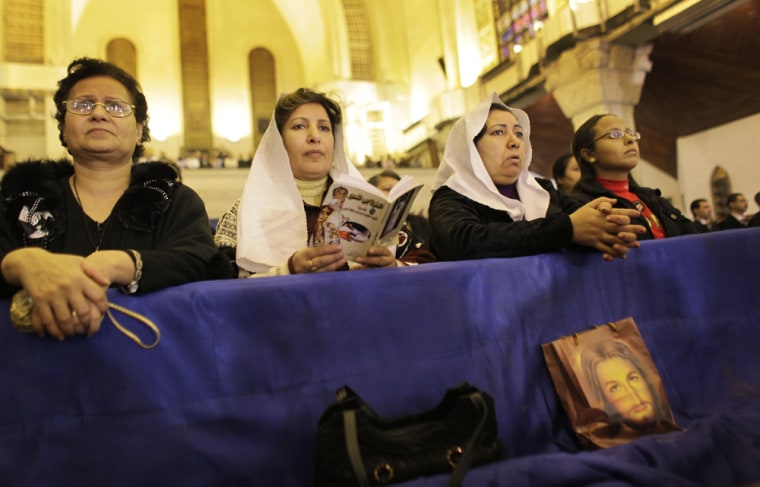Heavy-hearted Egyptian Christians, many sobbing and garbed in black, set aside fears to pack churches for masses celebrating their Christmas Eve, a ritual taking place under extraordinarily tight security meant to head off any attempt at an attack like the New Year's suicide bombing that killed 21 worshippers at an Alexandria church.
Al-Qaida in Iraq had threatened Christians in Iraq and Egypt in the weeks leading up to the holidays.
Militant websites had even posted names and addresses of churches in Egypt to target, raising fears of a follow-up attack on celebrations of the Orthodox Christmas, which Egypt's Coptic Christian minority marks Friday.
A heavy police detail was assigned Thursday to guard Christmas Eve services across the country.
Vehicles were blocked from parking near churches. Police and church staff checked IDs, which denote religion — as well as people's wrists, where many Egyptian Christians bear the tattoo of a cross.
A line of riot police stood at each end of the street at Saints Church in Alexandria, the target of Saturday's attack.
'I wish I could die in church'
Security officers with walkie-talkies fanned out across the streets surrounding the cathedral in the capital, Cairo, and metal detectors were set up at the entrances.
Despite the fears, turnout was heavy for a service Christians said they were determined to attend.
Muslims also joined some services as a show of solidarity.
"Some Muslims are good people," said Raymonda Ramzy, a 45-year-old worshipper dressed in black entering Mass at the main Coptic Church in the Cairo district of Giza. "But even on my way here, a couple of young men shouted at me, 'God take you all and rid us of you.'"
While some worried about attending services for fear of attack, she said, "I never hesitated. I wish I could die in church."
The bombing Saturday, which hit a crowd of worshippers leaving a midnight Mass at Saints Church, killed 21 and wounded nearly 100 in the deadliest assault on Egypt's Christians in a decade.
It was the first suicide bombing against Christians in Egypt, raising concern that al-Qaida may have a role, though investigators suspect a homegrown group carried it out.
The blast unleashed days of Christian clashes with police over what Copts say is the state's failure to protect them from deep, sometimes violent anti-Christian sentiment among the Muslim majority.

The government asked church officials to prevent crowds from gathering in front of churches Thursday after Mass — apparently to avoid providing a large target for attack, but perhaps also to avoid a new outbreak of protests.
State TV gave heavy coverage to the Christmas Eve Mass to promote a sense of unity. President Hosni Mubarak's two sons and several Egyptian government ministers attended the services, as did some foreign diplomats.
As in past years, state TV broadcast live Pope Shenouda III leading prayers and delivering his sermon at Cairo's Coptic Cathedral.
The 87-year-old head of the Coptic Church recited the prayers, his voice sounding tired and cracking.
He offered condolences "to our sons in Alexandria and in several other countries for the martyrdom of innocent people."
"I echo President Mubarak's remark that the blood of our sons is not cheap," the pope said.
This year, the ceremony was also preceded by a live discussion by a team of prominent TV hosts and newscasters, all dressed in black, standing on the cathedral steps and speaking of the bonds between Muslims and Christians.
Muslim support
A tiny logo of an intersecting cross and crescent was set in the corner of the screen. Christmas was declared a national holiday several years ago, in a nod by the government to inclusiveness.
"Today, I don't say I'm Muslim or I'm Christian," one of the hosts pronounced. "I say, I'm Egyptian."
Around two dozen Muslims held a solidarity gathering a street away from Saints Church — kept back by police.
They held signs reading "no to terrorism, yes to citizenship" and "long live the cross and the crescent."
The front pew at a church in the Cairo district of Omraniya was filled with prominent Muslims from the neighborhood.
Women in Islamic headscarves sat near Christian women in the headcoverings they don in church.
Many women sobbed heavily during the service. Omraniya was the scene of fierce Christian riots in November that left two dead, sparked when police stopped construction work at the church.
In his sermon, Father Hanna thanked the Muslims for attending, adding, "This is the way our Egypt climbs new heights and become prosperous."
"A lot is being said about national unity and I hope it is not just talk this time around," he said.
But many Copts are jaded by routine expressions of unity repeated after violence.
'It's worse than before'
Egypt's Coptic Christian minority makes up 10 percent of Egypt's 80 million people but complains of widespread discrimination they say relegates them to second-class status.
Anti-Christian violence has mounted in recent years, mostly shootings or clashes between Christians and Muslims in villages.
At Saints Church, blood stains on the wall were a grim reminder of last weekend's sectarian violence. A stream of black-clad worshippers flowed in as Mass began.
"It's worse than before," said Marina Sammy, a young woman at the Saints Church whose family owns a store in Alexandria. "The events haven't improved attitudes at all. We've been attacked and insulted and our store windows were broken. There's no security at all."
Diana Maher, at the Giza church, acknowledged the attempts to heal the rifts. But she said her own feelings toward Muslims had become stained with resentment and suspicion.
"At work, my Muslim colleagues and I say hello," she said. "But the first day back after the attack, I avoided them."